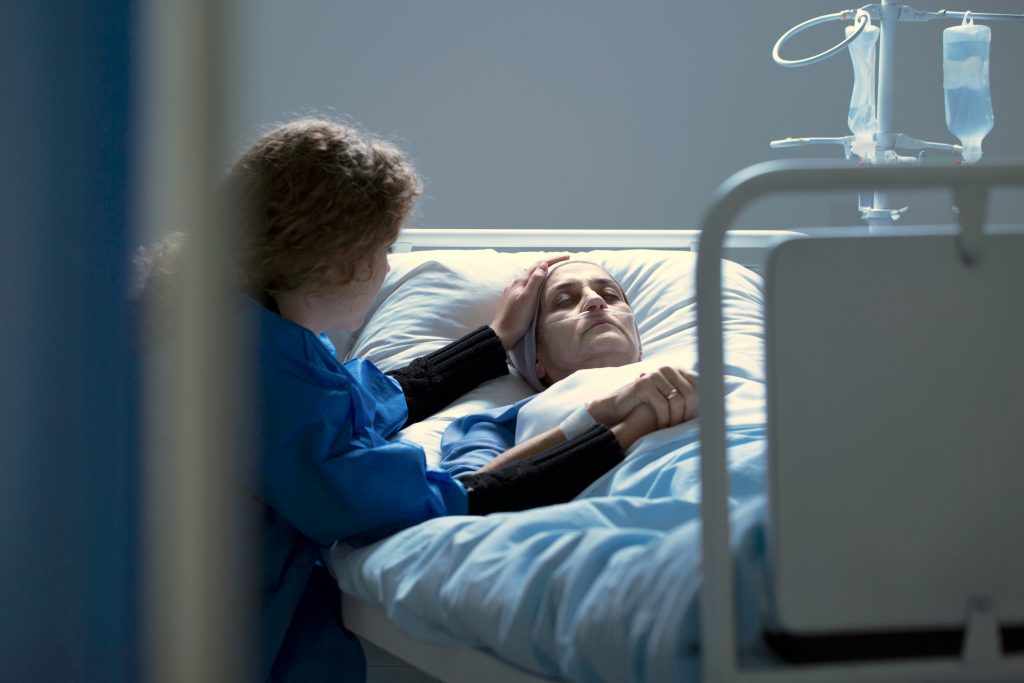I’ve just come from the deathbed of my friend MaryEllen. It was only two weeks ago that she went to the oncologist full of hope, only to be told that her bladder cancer was inoperable, and that soon her kidneys would shut down.
Her doctor held her hand as she cried, and she told me that he brushed away tears of his own. This amazed her, as she knew that dying patients are an oncologist’s bread and butter. She was deeply moved by his concern, and felt very sorry for him, even as she faced the certainty of her own approaching death. That’s the kind of generous woman MaryEllen is.
Her doctor said that the next step was home hospice, and explained that the hospice agency would make all things smooth for her; that she should concentrate on finding peace these last days, and that he didn’t doubt that she would, as he knew her to be a woman of a deep and abiding faith.
He recommended a Catholic agency, and told her that their nurses are priceless: tender and compassionate, and devoted with all their hearts to smoothing the way for their patients on the way to their next and better life. He was absolutely right.
Rita is the name of her day nurse. This week I’ve gone to visit my friend each morning and evening and have found Rita watchful at her post. She is from Honduras, and her light-brown hands are gentle, her voice soft.
She pats and moves and massages poor MaryEllen in exactly the same way a tender mother handles her newborn. She is full of confidence in the rightness of the process — in its naturalness.
This is only death, she seems to say, and we can smile serenely together as death scowls at us. We are not afraid! This is like our birth, but at the other end of life, uncomfortable, vertiginous, and abrupt, but just a short journey that we can get through together.
I left MaryEllen’s apartment today filled with admiration for nurses like Rita, and indeed for the vocation of nursing. I was thinking of the millions of suffering men, women, and children across the world who are comforted, both physically and emotionally, each day by their good nurses.
And just then I opened an email alerting me to the troubling news that the American Nurses Association (ANA) is contemplating changing its position on assisted suicide. Currently they oppose the practice, but are considering changing their position to embrace what they prefer to call “aid in dying.”
In their draft position statement, they take care to differentiate helping a patient to commit suicide from euthanasia. Regarding euthanasia, they say that it is “inconsistent with the core commitments of the nursing profession and profoundly violates public trust.”
But “aid in dying,” they say, is legal in many jurisdictions and just another way nurses can respect their patients’ right to self-determination and their desire to avoid suffering.
It seems to me the ANA is trying to draw too fine a moral line — and one that Rita would recoil from.
If a nurse holds the cup for the patient as she takes her lethal medicine (euthanasia) or simply brings her patient the cup of water and watches her silently while she succumbs to despair and commits suicide (aid in dying), in both instances she is morally responsible for that sad death.
Either way, helping a patient to hasten death violates the very essence of the nursing vocation and all its traditions, and is a false “compassion” — joyless and dreary.
It rips the covenant of the nursing profession with society into shreds, making a nurse the accomplice of despair, instead of the one who instills hope.
The nurse who would "aid in dying" through suicide is the very opposite of the tender hospice nursing I’ve been privileged to witness, watching as Rita creates an atmosphere of calm and acceptance in the sickroom, filling it with the peace of God.
MaryEllen is rapidly sinking, shrinking before my eyes as her organs shut down. I know that this is difficult for her, more difficult than I can begin to imagine, filled as I am with vigor and health. Probably one day I will find myself in that same position, waiting for death to come and release me from my suffering.
I hope that by then the nursing profession will not have been irretrievably harmed by those who would turn nurses into accomplices of suicide. I hope I am fortunate enough to have a nurse like Rita, who will soothe me like a tender mother and smooth my worried brow with warm hands.
She and I will face death bravely. Together.
Dr. Grazie Pozo Christie grew up in Guadalajara, Mexico, coming to the U.S. at the age of 11. She has written for USA TODAY, National Review, The Washington Post, and The New York Times, and has appeared on CNN, Telemundo, Fox News, and EWTN. She practices radiology in the Miami area, where she lives with her husband and five children.
SPECIAL OFFER! 44 issues of Angelus for just $9.95! Get the finest in Catholic journalism with first-rate analysis of the events and trends shaping the Church and the world, plus practical advice from the world’s best spiritual writers on prayer and Catholic living, along with great features about Catholic life in Los Angeles. Subscribe now!

